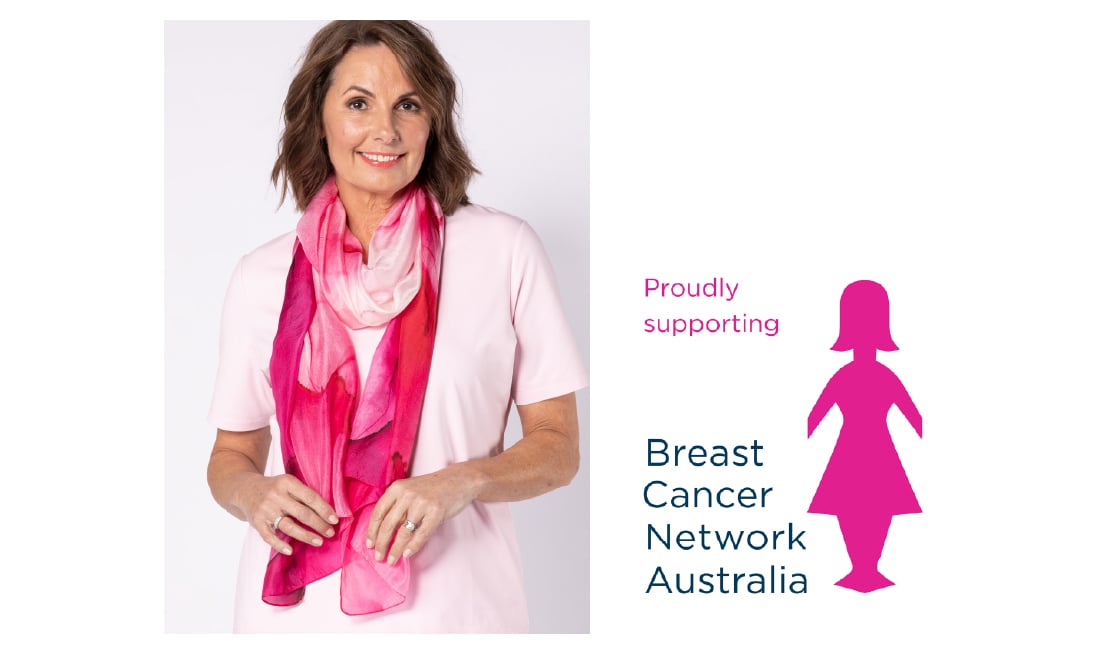BREAST CANCER AWARENESS MONTH

It’s Breast Cancer Awareness Month, and so this month we’re raising our voice to help spread the word about the importance of breast cancer screening and support. Fella Hamilton is joining the cause with 50% of proceeds from the pink Freya Silk Scarf going to Breast Cancer Network Australia (BCNA) in the month of October, an Australian organisation working tirelessly to make the breast cancer journey better.

Breast Cancer Network Australia (BCNA) is Australia’s leading breast cancer consumer organisation. They have worked tirelessly to ensure that all Australians who are affected by breast cancer receive the very best care, treatment and support.
BCNA was born out of a small group of determined women who wanted to make the breast cancer journey better. When Lyn Swinburne founded BCNA her vision was for no one to feel alone through their experience of breast cancer. In 2022, that vision still remains its priority.
They have built a strong and resilient network that brings together over 160,000 individuals with a lived experience of breast cancer. Its role is to advocate for, connect, support and inform those affected by breast cancer. BCNA work with the broader network to influence a stronger healthcare system. At the heart of the network are those at risk, those diagnosed and their supporters.

 Samantha styles up in our Fella Hamilton pink Freya Silk Scarf, designed by Sharyn Kayne ®, Caledonia 3/4 Shirt in white and Suzy Stretch Jean in navy.
Samantha styles up in our Fella Hamilton pink Freya Silk Scarf, designed by Sharyn Kayne ®, Caledonia 3/4 Shirt in white and Suzy Stretch Jean in navy.With our team member Samantha (Project Leader at Fella Hamilton) having been on her own journey through breast cancer and with the support of BCNA at the time, we spoke to Samantha about how the organisation provided help and hope during every step.

Can you tell us a bit about your personal journey in the last few years?
I was diagnosed with Breast Cancer in 2007 and again in 2020. I was only 32 in 2007, very young and the diagnosis was a complete shock. My medical team immediately encouraged me to contact the BCNA. The resources and availability of assistance were such a great support. My treatment was aggressive – surgery, chemotherapy and radiation. Looking back, there were many instances where I made a call looking for advice during each of the periods of treatment. In 2020, as a survivor and knowing BCNA was there was of great comfort.
How has Breast Cancer Network Australia been a support to you through your breast cancer journey?
Not only were they a support during my illness, with My Journey kit, but also after. There are many additional health and financial issues that arise as a breast cancer patient and also after as a survivor. For example, I was able to talk to other survivors during low periods in treatment and after treatment I was also able to access help with my finances. I often used the website to sort through and gain better understanding of terms used by my doctors – when I started to hear terms like DCIS, HER-2, advanced and aggressive, I needed to read it, absorb it, understand it or ask more questions if I didn’t!
What would be the first steps a person would take to engage with the network?
Listen to your medical team! Your GP, surgeon, oncologist or radiation oncologist will all have information on BCNA for you. BCNA’s services have continued to improve with increased funds and resources (that’s why donations are so important) and include more online services, webcasts and podcasts. Women and men can find out about their illness, read others’ stories, etc. Sometimes your doctors are treatment focused and BCNA can help you take a step back to understand some of the terms that might have been a blur when you first received your diagnosis.
How can a person support their loved one who is undergoing breast cancer treatment?
There are many things you can do! Try not to worry about how they look (straight after treatment I did not look all that healthy, that’s for sure) and try to keep things normal. What would you normally do on the weekend with them, eg. go to the movies, go for a walk, watch the footy at home with party pies? Continue to do these things with them if they are well enough. Offer to drive them to their appointments, as there are many and it can be a lot for family members. Also, don’t be afraid to tell people. In the beginning, you have to tell that same story about your diagnosis and treatment to your family, friends and work colleagues. It can get to be all too much – ask someone to be a spoke person for you to help ring family and inform the boss.
Do you have any self-care tips that you’d like to share?
Drink water, look after your skin and moisturize constantly, follow advice on teeth and mouth care, go to the optometrist regularly and don’t worry about losing your hair – it grows back! Definitely don’t be afraid to have bad days, the good days will always come around!



